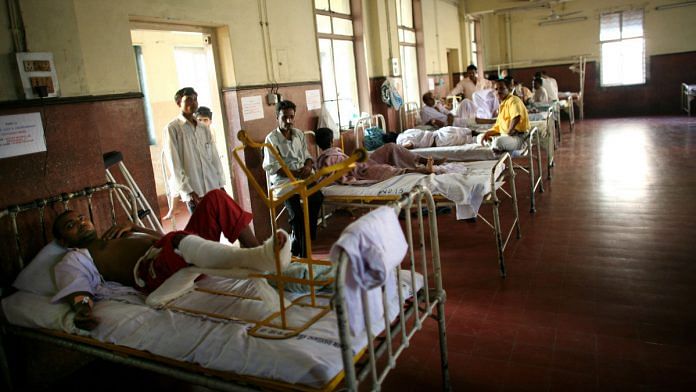Hospitals that avail of concessions will have to enrol for Ayushman Bharat. Move part of efforts to resuscitate flagging Modicare.
New Delhi: The Modi government has turned to Plan B after failing to get private hospitals on board Ayushman Bharat, its ambitious healthcare insurance scheme.
As part of the efforts, the government has now decided to incentivise and ease the process of setting up private hospitals in tier II and tier III cities, where most of the beneficiaries reside.
Hospitals that avail of these concessions will, however, have to compulsorily enrol for all government schemes, particularly Ayushman Bharat, ThePrint has learnt.
Ayushman Bharat or Modicare, touted as the world’s largest health insurance project, is a big-ticket initiative that the government hopes to cash in on politically ahead of the 2019 general elections.
The scheme assures a health insurance cover of up to Rs 5 lakh per family every year to 50 crore poor and vulnerable persons, to start with.
But since the enrolment process began in August, of the almost 80,000 private hospitals in India, the government has empanelled or is in process of empanelling just about 7,700 such hospitals, less than 10 per cent.
The bone of contention between the private hospitals and the government continues to be the rates proposed for surgeries and other medical procedures.
While it has not addressed the rate question, the Central government has decided to offer concessions such as faster approvals for setting up of hospitals, subsidised land to build them and viability gap funding among others. The new proposal is particularly aimed at encouraging private players in tier II and tier III cities.
Also read: In first 2 weeks, 47,091 beneficiaries admitted under Ayushman Bharat
The Plan B
Worried by the disinterest among private players for the scheme, Niti Aayog, in consultation with the Ministry of Health and Family Welfare, studied three models — doctor-owned hospitals with 30 to 50 beds, doctor-manager partnership hospitals of up to 100 beds and multi-speciality hospitals of above 100 beds.
Niti Aayog’s draft plan, reviewed by ThePrint, focuses on the setting up of these hospitals in tier II and tier III cities.
The plan notes that the scheme will require at least 6.4 lakh additional beds in the next 10 years, which it says can only be achieved by “three times more growth of hospitals primarily focused on tier II and III cities”.
The draft plan has been sent to the states, with the Centre urging them to identify and earmark land.
“The information on the identified land will later be made available on the Ayushman Bharat and ministry website from where private players can choose the land and location they want to buy,” said a senior official from the health ministry working with Niti Ayog.
“We will offer the land at the subsidised rates or on long-term leases or through the bidding process.”
The government also plans to facilitate permissions and clearances through special window timelines. Opening a hospital requires at least 15 licenses and approvals, all of which take time.
For instance: Approval on a building plan takes at least three months and approval from the pollution control board also requires three months.
According to the draft, states will be allowed to “put a clause that if authorities do not examine and issue any of the clearances by the said stipulated time, the clearances shall be deemed to have been given on expiry of the stipulated period.”
Also read: Modi’s Ayushman Bharat and price control will bring down quality of healthcare in India
Viability gap funding, which is to support projects that are economically justified but not financially viable, are also on the cards.
Private sector is still not enthused
The private sector, however, is discontented with the proposed rates for 1,350 surgeries and procedures under Ayushman Bharat, which they say are 15-20 per cent lower than the Central Government Health Scheme (CGHS) – an existing insurance-based government healthcare scheme.
They are also awaiting the clearance of pending dues of over Rs 800 crore under CGHS.
“Under the new draft, the calculations done by government are unrealistic,” said Girdhar J. Gyani, director general, Association of Healthcare Providers, India (AHPI), which represents 2,500 speciality and 8,000 smaller hospitals.
“The cost of operations per bed at a hospital that has 30-50 beds is Rs 4,700, irrespective of its occupancy. According to the government estimates, it is Rs 725.”
The private hospitals also cite a ‘slow return’ on investment for being lukewarm to the proposal.
“Earlier, the return on investment would start coming within three years. Now, it will take an estimated seven years before we start getting the returns,” said a senior doctor who runs a popular chain of hospitals.



